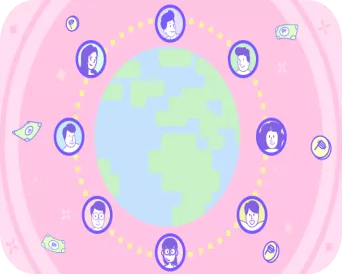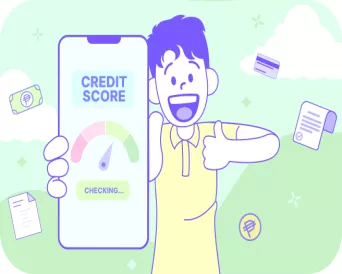EDUCATION IS A RIGHT.
But the sad reality is that education, especially quality education in the Philippines, comes with a hefty price tag. This is the reason why as many as 3.6 million Filipinos are considered part of the growing population of out of school youths. This alarming figure was further aggravated by the resumption of in-person classes in 2021.
Now, you might be wondering: What makes education so expensive?
Here’s the truth, luv. The biggest factor for the rising cost of education is none other than tuition fees in the Philippines. And in this article, we’re taking a closer look at what tuition fees are and how do they differ in the three main educational stages here in the Philippines.
Table of Contents
Did You Know: Good Credit Unlocks Better Loans
Bad credit gets you bad loans. Good thing it's never too late to start building with Tonik Credit Builder Loan!
What are Tuition Fees?
Tuition fees are the charges students must pay to attend educational institutions, such as schools, colleges, and universities. In the Philippines, tuition fees cover the cost of instruction and other educational services provided by the institution. In essence, tuition fees are like the price tag for the education journey, luv!
Understanding tuition fees is crucial for several reasons:
-
Firstly, it directly affects accessibility to education. The amount you need to pay can either open doors to quality education or create barriers if you can’t afford it. Knowing the tuition fees allows you to plan and make informed decisions about your child’s educational path.
-
Secondly, tuition fees impact the overall quality of education. Higher tuition fees can sometimes mean better facilities, smaller class sizes, and a more personalized learning experience.
-
Lastly, being aware of tuition fees helps students determine how they can fund their education. Whether through scholarships, financial aid, educational plans, or student loans, understanding the cost of education allows students to explore various options and find the most suitable way to finance their studies.
In the Philippines, there are two primary educational avenues: public schools and private schools. Public schools, under the government’s care, emphasize accessibility and affordability by offering education at cheaper fees. On the other hand, private schools provide an alternative with distinct features. They often have enhanced facilities, smaller class sizes, and a diverse range of supplementary programs.

Grade School Tuition Fees
Grade school is where it all begins. It serves as the cornerstone of our learning here in the Philippines. Grade school usually spans from kindergarten to sixth grade.
Tuition fees in the Philippines greatly differ between public and private grade schools. If you enroll your child in a public grade school, you do not need to pay any tuition fee because it is subsidized by the Government. But if you choose to send your child to a private grade school in the Philippines, you will need to spend at least PHP30,000 up to PHP100,000 a year on average just for tuition fees. Take note that some grade schools charge up to a whopping PHP200,000 per year, too.
Why do some private elementary schools in the Philippines charge so much for tuition fees alone? Well, luv, they offer extra special programs for your child’s development. Some schools use international-standard materials. Others even offer foreign language classes to young learners to better equip them for the future. So, it really depends on what you want for your child as well as what you can afford. Remember, grade school is just the beginning of your child’s lifelong learning. There are at least two more stops along the way!
TOCHigh School Tuition Fees
With the K-12 education system in effect, students now need to spend up to 6 years in high school. This includes a 2-year Senior High program, where children can choose specialized classes according to their individual preferences. And of course, that means extra costs!
Fortunately, tuition fees in public high schools in the Philippines are also covered by the Government. So, if you have a tight budget, it’s relatively easier to get your child enrolled in high school if you choose that route.
But if you’re interested to know how much it would cost to send your child to a public high school in the Philippines, the average annual tuition fees for private high schools is between PHP 45,000 to PHP 150,000.
Take note that high school tuition fees in the Philippines greatly varies depending on their year level. Junior high school students (Grades 7-10) have relatively similar tuition fees every year. But once your child decides their Senior High track, then that’s where you’ll see a bigger tuition fee increase. Generally, STEM students must spend more on their tuition fees than students in other tracks.
TOCCollege Tuition Fees
Tertiary education is perhaps the most important part of a person’s learning – at least in the Philippines. It is going to dictate what career your child is going to have once they graduate. The price of college tuition fees in the Philippines, therefore, varies significantly depending on several factors.
Thankfully, the Free Tuition Law covers the tuition fee of college students enrolled in state universities and colleges, as well as technical vocational institutions. But choosing private colleges and universities comes at a greater cost. Here are estimate private school tuition fees for the most common college courses in the Philippines:
| Course | Estimate Tuition Fee per Year |
| Nursing | PHP 80,000 – PHP 120,000 |
| Accountancy | PHP 60,000 – PHP 100,000 |
| Information Technology | PHP 50,000 – PHP 90,000 |
| Education | PHP 50,000 - PHP 90,000 |
| Engineering | PHP 82,000 – PHP 150,000 |
Suggested Read: The True Cost of Higher Education in the Philippines
TOCWays to Fund Education in the Philippines
Understanding tuition fees is one aspect, but finding ways to fund education is equally crucial. Here are some avenues are available to assist students in pursuing their educational dreams:
- Government Financial Assistance Programs: The Philippine government offers various financial aid programs, such as scholarships, grants, and educational subsidies, to support students from low-income families. But of course, these kinds of financial aids have strict screening processes and limited slots. If you want your child to take advantage of these benefits, be sure you’re ready with their application forms ASAP!
- Private Scholarships or Grants: Many private organizations and corporations offer scholarships or grants based on academic merit, talents, or specific fields of study. If you want to know what private scholarships your child is qualified for, start by doing a quick Google search. You’ll never know if you never try.
- Educational Plans: Prepaid educational plans and savings accounts are available to help you save for your children's education. This ensures that you have sufficient funds when the time comes. Just do your due diligence before putting your funds in such financial institutions.
- Loans: Loans can definitely be a great choice to pay tuition fees, especially if you need to pay ASAP. Hassle-free loans like Tonik Credit Builder Loan can be a lifesaver and can also help you invest in education a lot wiser. The only thing you need to remember about loans is your repayment. Keep track of it and never miss it to avoid any unwanted penalties.
Just to Remind You, Luv
To wrap things up, I want to remind you: Education costs aren't just about tuition fees, luv. There are other things to consider, like books, getting around, and your child’s daily sustenance. Luckily, we've got things like the Free Tuition Law and Credit Builder Loan to make sure you have enough funds on hand.
So, all that’s left to do now is to plan. Carefully plan how you’re going to fund your child’s education and support their educational journey as best as you can. There’s a suitable education track for your child, there’s no one track fits all, and it’s best to uncover which track will help your child develop and push them into the direction of their dream jobs. Your child is lucky to have a responsible parent like you!
![3 students surrounded by money elements to represent tuition fees in the Philippines]](/sites/default/files/styles/blog_main_landing_page/public/2023-08/081023-Blog-Investing-In-Education-A-Closer-Look-at-TF-in-the-PH1248x589---SEO-Main.png.webp?itok=NlQ9z9Kg)





